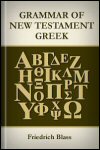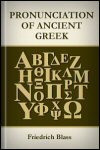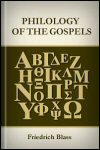Friedrich Blass Greek Studies Collection (3 vols.)
Digital Logos Edition
Overview
Friedrich Blass is one most important names in nineteenth century scholarship. His contributions to the study of Greek grammar cannot be underestimated by anyone interested in Classical or New Testament studies even today. Most, if not all, students of New Testament Greek will be familiar with the 1961 English translation of his grammar, A Greek Grammar of the New Testament and Other Early Christian Literature, but not all might be aware that his scholarly contributions extended from Classical studies to Greek grammar, philology, and even textual criticism. This collection contains Blass’ important works in these fields for New Testament studies.
The scholarly work of Blass can be characterized by precision, rigorous analysis, and an incredibly knowledge of both primary and secondary sources. When many grammarians were merely working from critical texts, Blass determined to go back to the manuscripts themselves. In this way, he is not only able to refer to New Testament texts for evidence for grammatical phenomena, but also the differences in the manuscript tradition. This painstaking focus on the smallest details has given Blass’ grammatical, philological, and textual efforts an enduring quality that has lasted to this day and set him apart from the other grammarians of his day.
The three volumes provided in this collection represent Blass’ most important contributions to New Testament studies available in English, two of which were translated and a third as an original English composition. Valuable for both the student and the scholar, the Friedrich Blass Greek Studies Collection (3 Vols.) is a necessary component for the exegete’s tool belt.

Key Features
- Detailed indices of subjects and Greek words for quick reference
- Essential readings in Greek grammar and phonology
- Valuable discussions of the history and text of the Gospels
In the same breath with Moulton and Robertson the name of Friedrich Blass deserves commemoration. . . . One of the innovations of Blass was the citation of textual variants according to the manuscripts rather than according to printed editions, as Winer and Buttmann had done. Blass made liberal use of the LXX and frequently cited the apostolic fathers.
—Frederick W. Danker, Multipurpose tools for Bible Study
[Blass] represents a transition towards a new era. The translation [of his Grammar] by H. St. John Thackeray has been of good service in the English-speaking world..
—A. T. Robertson, A Grammar of the Greek New Testament in the Light of Historical Research
First published in 1898, [Philology of the Gospels] remains a useful resource for textual criticism of the gospels. . . . Blass' analysis of gospels texts does not shy from particulars of conflicts among early manuscripts of the gospels, nor from striking sweeping summary statements such as this: ‘We clearly see that there have been very ancient readers who did not shrink from willful alterations of the sacred text, if it did not suit their dogmatic convictions, or if it might give support to opposite tenets.’ But rather than casting doubt on the authority of Scripture, Blass' analysis represents a redoubled effort to hear each author's voice more purely.
—Nathan Bierma, Calvin College
Product Details
- Title: Friedrich Blass Greek Studies Collection
- Author: Friedrich W. Blass
- Translators: Henry St. John Thackeray and W. J. Purton
- Publisher: MacMillan & Co. and Cambridge University Press
- Volumes: 3
- Pages: 796
Individual Titles
- Grammar of New Testament Greek, Trans. Henry St. John Thackeray
- Pronunciation of Ancient Greek, Trans. W. J. Purton
- Philology of the Gospels, by Friedrich Wilhelm Blass

Though genetically related, Grammar of New Testament Greek is a distinct work from the later incarnation of A Greek Grammar of the New Testament and Other Early Christian Literature. Recognizing that the Hellenistic Greek in the New Testament has its own system of regular grammatical laws which needed description independent of Classical Greek, Blass determined to present the structure of New Testament Greek on its own terms rather than on the expectations of Attic Greek. The result is a New Testament grammar that both takes into account the development of the Greek language from the Classical period into the Koine, but also respects the Greek of the New Testament for its own genius and regular structure.
Beyond the pure grammatical strengths, Blass’ work as a textual critic add an additional strength to this volume. Grammarians preceding or contemporary to Blass merely used the critical editions of the New Testament available to them: Tischendorf, Tregelles, or Westcott & Hort. Blass broke this trend by going back to the manuscripts, allowing his readers to draw their own conclusions about the true text of a given passage themselves. Thus, Blass’ grammar not only provides students and scholars a description of New Testament Greek, but also provides a sort of text critical commentary on passages cited in light of the grammatical issues involved. For this reason, this volume is extremely valuable not only for grasping the grammar of New Testament Greek, but also for determining and understanding the text of the New Testament as well.
How does this edition of Blass’ Grammar differ from BDF?
With the publication of Thackeray’s translation of Blass’ Grammar, there are now two different editions of Blass available for Logos Bible Software: Grammar of New Testament Greek available in this collection and also Grammar of the Greek New Testament and Other Early Christian Literature revised by Albert Debrunner and translated by Robert W. Funk (BDF). In a technical sense, the edition of Blass, as translated by Thackeray, can be viewed as the precursor to the edition translated by Funk. For instance, BDF builds and expands on Blass’ original emphasis in directly using manuscript evidence and regularly referring to extra-Biblical works such as the Apostolic Fathers. Yet at the same time, BDF should in no way be considered a replacement for the work of Blass and Thackeray. This is because in order to keep the grammar concise, while still adding more and more data, Albert Debrunner was forced to reorganize the entire volume, while also removing extended discussions to make room for more references and analysis. Logos Bible Software’s Scholar-in-Residence, Steve Runge, helpfully explains the situation:
If you are doing thorough research in Greek, Thackeray's translation of Blass is essential. Why? Because it is a translation rather than an updated redaction like BDF. Anyone writing in English prior to the publication of BDF will be citing Thackeray’s translation, including A.T. Robertson. For example, in reading Robertson’s discussion of the historical present he commends Blass for an important insight, one which did not survive the editing process in BDF. A quick comparison of the works by page count (excluding front matter and indices) shows an almost 15% reduction in content. If the editors added new data, then even more content from the original edition had been eliminated. Some of the most helpful insights I have found in Blass are his rabbit trails. These side notes are what moved Debrunner to reorganize the volume in both second and fourth editions, based on the limitations of working in print. Thankfully, as Logos resources, neither edition suffers from the limits of print. Thus, finding relevant discussion, whether it is on topic or not, is just a simple search away using keywords in both. If you want the vast references, you want BDF, but if you want the details, then you want the original. I’d highly recommend both resources for anyone doing serious study in Greek grammar.

With the publication of Pronunciation of Ancient Greek, Blass entered into a debate that continues to this day: what is the correct historical pronunciation of Ancient Greek. Here Blass presents what he terms the true “Erasmian” pronunciation, not refer to the traditional pronunciation in universities and seminaries, used merely for convenience and practicality, but instead, his proposed historical reconstructed pronunciation based on cross-linguistic and historical evidence culled from transliteration of Greek into other languages such as Latin and the spelling errors of the transcriptions and papyri.
While the practice of the traditional pronunciation based on the language of the learners continues to be maintained in the classroom, gaining a grasp of how the pronunciation of Greek developed from the Classical period through the time of the New Testament all the way through Modern Greek is crucial for understanding grammatical developments of the language and also textual criticism. Many of the changes in pronunciation directly influenced changes in grammar such as the loss of the optative mood. Moreover, the development of Greek pronunciation is of critical importance to textual criticism. In many cases, knowledge of pronunciation is a sort of prerequisite for understanding how various textual variants developed in New Testament manuscripts. In sum, for both grammar and textual criticism, Blass’ Pronunciation is an essential volume for the student of the New Testament.

Building on his critical editions of the Gospels and Acts, Blass presents his theory of the history background and text of Luke’s two volume Gospel and Acts in Philology of the Gospels. He deals with issues of the Gospel’s literary character, the location and date of writing and the condition of its text. The variety of issues examined and the quality of the discussion caused Alfred Plummer to write, “The interesting work on the Philology of the Gospels, by F. Blass, is chiefly occupied with the Gospel of S. Luke, and should be read side by side with the sections of the Introduction to this volume which treat of the same topics” in the preface to his International Critical Commentary on Luke.
This title is included in the following collections
You can save when you purchase this product as part of a collection.
Verbum 8 Diamond Legacy Librar...
$2,999.99$2,999.99Verbum 9 Diamond Legacy Librar...
$2,999.99$2,999.99Verbum 10 Diamante Bilingüe (E...
$3,999.99$3,999.99Verbum 8 Portfolio Legacy Libr...
$4,749.99$4,749.99
- $4,749.99
- $4,749.99
- $7,749.99
- $7,749.99
- $21,749.99
- $24,999.99
About Friedrich Wilhelm Blass
Friedrich Wilhelm Blass was a German Protestant classical scholar who lived from 1843 to 1907. During the course of his life, he published extensively on textual criticism of classical authors, such as Demosthenes, Isocrates, Dinarchus, Aeschines, and many others. In the New Testament he published critical editions of the Gospels and Acts, which eventually became the basis of his work Philology of the Gospels. In Indo-European Linguistics and Greek grammar his major contributions included his monograph, Pronunciation of Ancient Greek, his important Grammar of New Testament Greek, and his revision and significant enlargement of Raphael Kuhner’s classical grammar.